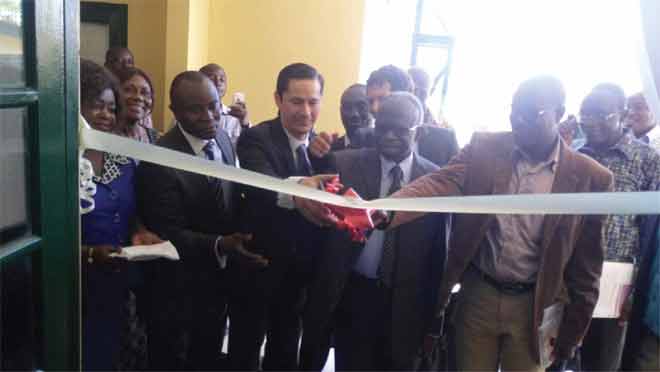‘Make use of SRI in Planting for Food and Jobs programme’


Dr Victor Agyemang (4th left ), the Director-General of the CSIR, being assisted by Mr Daniel Lauchenauer (3rd left) to cut the tape to inaugurate the refurbished laboratory
The Soil Research Institute of the Council for Scientific and Industrial Research (CSIR-SRI) has asked government to factor its research findings into the “Planting for Food and Jobs” programme to ensure that the right plants were planted on the right soil to produce the desired yield.The institute has zoned the country per its soil texture and structure to guide farmers and investors so that planting will not take place in the wrong soils.
The Director for the Soil Research Institute in Kumasi, Dr Joseph Opoku Fening, said all government interventions, including the one-district one-factory policy, would need the institute’s assistance to determine which area was suitable for what production.
Refurbished laboratory
Dr Fening was speaking at the inauguration of a $250,000 refurbished analytical laboratory sponsored by the Switzerland Government, through the State Secretary for Economic Affairs (SECO) and implemented by the United Nations Industrial Development Organisation (UNIDO).
A number of technicians of the institute were also given training to provide services at the lab.
The upgrade of the CSIR-SRI laboratory by UNIDO through the Trade Capacity Building (TCB) programme for Ghana is part of an ongoing strategy to strengthen the country’s testing laboratories to provide reliable and internationally accepted tests for sustainable value chains for exports.
Dr Fening said the laboratory was to serve both the private and public sectors and provide an answer to the destroyed water bodies by illegal mining, popularly called ‘galamsey’.
The SRI has the capacity to effectively conduct soil classification, land evaluation, soil fertility management, soil mechanisation and water management, environment and climate change laboratory analytical services.
Director-General
The Director-General of CSIR, Dr Victor Agyemang, urged the SRI to commercialise its research findings, especially to the private sector, to enable it to raise the needed funding to maintain the equipment.
He said it was time the institute became much more relevant to its surroundings before affecting the entire nation ‘because that’s the way to go’.
The Deputy Head of Cooperation of SECO, Mr Daniel Lauchenauer, expressed the hope that the centre would help to make Ghana’s cocoa production even better for supplies to Swiss chocolate production centres.
The Swiss rely heavily on Ghana’s cocoa for production of chocolate and Mr Lauchenauer believed the laboratory would boost Ghana’s cocoa industry.
Source: Graphic